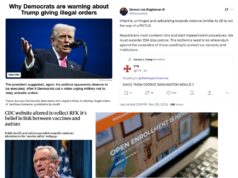This piece has appeared in newspapers in VA-06.
Everyone old enough to remember an earlier era should recognize that American politics have grown uglier and more dysfunctional. If we compare the period from the end of World War II up until, say, the 1990s, with the period since, the deterioration is unmistakable.
People who worked on Capitol Hill as recently as the 1980s say there has been a striking decline in the cordiality and constructiveness of the interactions between lawmakers of the two parties. And any citizen can see how the relations between the parties manifest a rancor and bitterness way beyond what was seen in America for generations.
Whereas people in an earlier era understood politics to be about the art of the compromise, a large portion of our current electorate rejects the idea of compromise, preferring all-out conflict even at a time when elections have given us divided government.
Whereas previously there was a widespread ethic for showing respect to the office of the president, and thus for the system, regardless of one’s opinion of the particular office-holders, nowadays there are political rewards for treating the president with contempt.
Whereas in an earlier era, it was generally accepted that sometimes you win and sometimes you lose, and that when you lose you deal with that and move on, in our times we see a lack of acceptance of the legitimacy of duly-elected opponents, and an unwillingness to acquiesce in duly-passed legislation becoming the law of the land.
This transformation is of utmost importance. It’s not just that these changes make the American scene uglier than it used to be. Such deterioration of our politics has also inflicted profound damage: The resulting dysfunctionality of our political system has made us as a nation unable to act to meet the challenges we face.
With changes so stark and so consequential staring us in the face, one would think that our national conversation would have focused on the question: “Why have things gone wrong?”
It seems an essential question: Identifying the forces that have moved us in this unfortunate direction would seem necessary for figuring out what has to change now to restore America to political health.
And isn’t it customary in America – when we face calamities — to raise such questions?
When terrorists strike our homeland, do we not empanel blue-ribbon commissions to look into how our security systems failed to prevent the attack?
When the threat from the Zika virus appears, do we not launch serious research into its causes and consequences and ways of blocking its means of transmission?
Arguably, the breakdown in our nation’s ability to govern itself effectively is a greater threat to our national well-being than either of these.
Moreover, the question about our political deterioration – much more than those others – is one that calls for citizen involvement. It is we citizens, after all, who are ultimately responsible for the health of our democracy. And when our politics functions less constructively, it can be assumed that one part of our disorder involves the citizenry rewarding rather than rejecting destructive political conduct.
Identifying the forces that have moved us in this unfortunate direction would seem necessary for answering the related question, “What has to change for America’s political health to be restored?”
How is it, then, that this question – which ought to be at the center of our public discourse – has received hardly any sustained attention in our mainstream discourse?
Imagine a Rip Van Winkle who awakens now from a sleep begun during those post-war decades. How amazed he would be to see how poorly America’s political system is functioning—with the least productive Congresses in our history, failing to pass legislation dealing with festering problems like the of millions of undocumented immigrants living in the shadows, and with the challenge of climate change.
Our Rip Van Winkle would doubtless ask us, “How did this happen?”
Then imagine our newly awakened American from that earlier era looking into our mainstream public discourse around that question during these years of deterioration. He would be freshly amazed, would he not, to see how little that question has been raised in our mainstream public discourse? Would he not be amazed to see how the nation – its citizens, its politicians, its media – seemed so little interested in knowing what had changed in America to make it possible for so many unprecedented political developments to occur?
I imagine our Rip Van Winkle then asking Americans as a people, “How can you not be asking how this happened?”



![Saturday News: “Trump Has a Recipe for War and Corruption, Not Peace”; “Trump and Mamdani’s White House Lovefest Leaves Trump Allies ‘Shocked'”; MTG Announces Resignation, “expects the MAGAs to lose the midterms, and for Donald Trump…to be impeached”; Thanks to Trump, “[VA’s] fiscal situation is not healthy”](https://bluevirginia.us/wp-content/uploads/2025/11/montage1122-238x178.jpg)

![Thursday News: “MBS seemed less aggrieved than Trump”; “The Vibecession Deepens”; “[Trump DoJ] Simply Can’t Be Trusted with the Epstein Files Transparency Act”; Trump’s “lame duck dictatorship”; “Trump’s ‘piggy’ insult is stoking more outrage than usual”](https://bluevirginia.us/wp-content/uploads/2025/11/montage1120-238x178.jpg)






![Saturday News: “Trump Has a Recipe for War and Corruption, Not Peace”; “Trump and Mamdani’s White House Lovefest Leaves Trump Allies ‘Shocked'”; MTG Announces Resignation, “expects the MAGAs to lose the midterms, and for Donald Trump…to be impeached”; Thanks to Trump, “[VA’s] fiscal situation is not healthy”](https://bluevirginia.us/wp-content/uploads/2025/11/montage1122-100x75.jpg)
